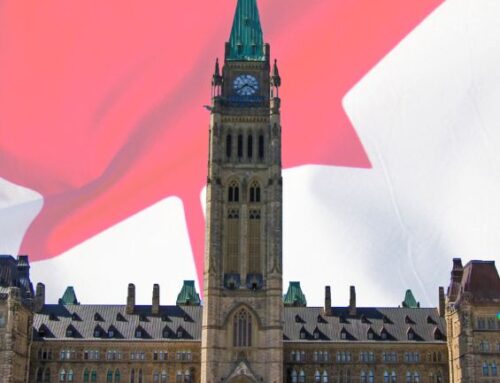
Interim leader Bob Rae wants a revitalized Liberal Party, but he is pushing the same left-wing social agenda.
For three days in mid-January, more than 3000 members of the Liberal Party of Canada debated and voted on measures they hoped would rejuvenate the party’s fortunes after finishing third in last May’s federal election.
Speaker after speaker at the Jan. 13-15 biennial convention in Ottawa either urged the party to be bold or congratulated the Grits for being courageous in its attempts to reach out to reconnect with erstwhile Liberals and new voters. The centerpiece of these efforts was an opening of the party to permit a new classification of “supporter” which would allow Canadians to vote in riding nominations and leadership races but which would stop short of the privileges of membership including going to conventions as delegates or voting for riding and national executives.
Jim Hughes, national president of Campaign Life Coalition, told The Interim that the creation of supporter-status might provide an opportunity for pro-lifers within the party. Noting that in the 1990s, Liberal leader Jean Chretien over-rode riding nomination elections and parachuted candidates to prevent individuals supported by Liberals for Life from standing as the candidate of record for the Liberals, he said the new rules might encourage grassroots democracy within the party and permit “genuine nomination fights where pro-lifers have a real chance.”
CLC is non-partisan and supports pro-life candidates and activists in all parties. Unfortunately, said Hughes, “for too long, the Liberal Party has made it difficult for pro-lifers to have a fighting chance at the local level and their leaders at the top have pushed pro-life and pro-family voters away with their radical anti-life and anti-family policies and rhetoric.”
To become a supporter, which does not cost anything (unlike memberships, which are $10 each), an individual must sign a form that says he or she agrees with the broad principles of the Liberal Party.
Johanne Brownrigg of Campaign Life Coalition’s Public Affairs office in Ottawa attended the conference and reported that one of the most common phrases she heard in plenary discussions, in the halls of the convention centre, and on the floor of the meeting, was that the Liberal Party is “fiscally responsible and socially liberal.” The Liberal delegates reinforced the socially liberal part of that equation by considering and, in some cases, passing policy resolutions on marijuana, abortion, euthanasia and family issues.
A plenary session debated euthanasia and despite support for legalizing euthanasia and assisted-suicide was expressed in the plenary sessions, no resolution on the subject made it to the convention floor.
There was also support for universal daycare and home-care/palliative care in the plenary sessions.
Two priority resolutions that made it to the convention floor were decriminalizing marijuana and affirming “reproductive rights”
The reproductive rights resolution passed without debate, which would occur only when 25 members demanded it. The resolution was introduced by Wendy Robbins of the National Liberal Women’s Commission and according to observers at the convention, she received the second most applause among anyone who spoke on policy.
According to the resolution, since “legal abortion” as “guaranteed under the Canada Health Act” is an “integral part of women’s overall health care,” which some health institutions “refuse to perform” or outright “exclude” from their list of services, the Liberal Party of Canada will “urge the Government of Canada to enforce the provisions of the Canada Health Act to guarantee women’s access to timely and effective reproductive health services.”
The resolution also demands that the “Government of Canada financially penalize provinces that fail to abide by the provisions of the Canada Health Act” regarding reproductive services, including access to abortion.
Fewer than 600 of 3200 delegates voted to affirm support for abortion access in Canada and 92 per cent of those voting supported the resolution.
There was a robust debate over legalizing marijuana which was introduced by the Young Liberals of Canada and 77 per cent of the 1300 delegates present at the time supported the resolution. The convention resolved that a new Liberal government will “legalize marijuana and ensure the regulation and taxation of its production, distribution, and use, while enacting strict penalties for illegal trafficking, illegal importation and exportation, and impaired driving.”
In his closing remarks, interim Liberal leader Bob Rae, who prior to the convention admitted to smoking pot when he was younger, joked, “after the resolution on marijuana today, there is going to be a group of even happier people in the Liberal Party.”
CLC’s Jim Hughes said “in recent years the Liberal Party has lost the support of many pro-life and pro-family voters and while they seem to have opened up their party, they do not seem to have learned that they need pro-life and pro-family voters if they want to return to power.” Noting that in the 1980s and early ‘90s, a quarter to a third of the Liberal caucus was pro-life, he observed, “with votes supported abortion-on-demand and legalizing pot, the party is doing a very poor job reaching out to disenchanted Liberals who support their economic agenda but not their social liberalism.”
– With files from Johanne Brownrigg
and Paul Lauzon




